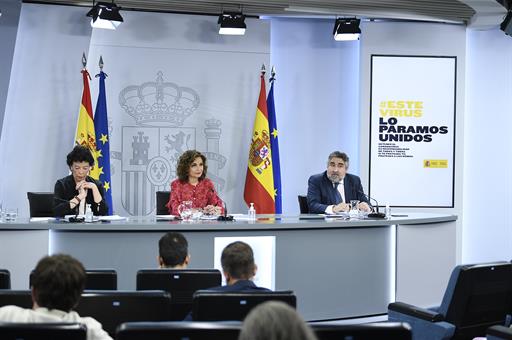Council of Ministers
The Government of Spain Presents a Single Vocational Training System that Connects Training with Employment
Council of Ministers - 2021.6.15
Moncloa Palace, Madrid
The Council of Ministers analysed the draft of the future Organic Law on the Organisation and Integration of Vocational Training, which consolidates a single, accreditable and flexible training offer aimed at students and workers, both employed and unemployed.
The Minister for Education and Vocational Training, Isabel Celaá, stated that one of the main objectives of the Ministry of Education is to transform vocational training so that it is of the highest level, is adapted to the demands of the labour market and meets people's interests and aspirations for professional qualifications.
Isabel Celaá mentioned four structural problems of current vocational training: imbalance between the level of training and the needs of the labour market; low accreditation of professional skills; little time dedicated to training; and low enrolment of students in such courses.
The future law will radically change the system and modernise it in order to overcome all these difficulties. The minister explained that the new model is based on participation, public and private co-responsibility, close links between training centres and companies, the connection between supply and demand, innovation, research and entrepreneurship.
Celaá explained that vocational training for young people in education and training for employment are integrated into a single model: "It is a radical leap forward compared to the previous regulation as it presents a single system throughout life. There is no loss of efficiency.
New Training Offer and Dual Training
The future regulation introduces a new offer by ascending training grades: Grade A: partial accreditation of skills; Grade B: certificate of professional competence; Grade C: Professional Certificate; Grade D: Training cycles (basic, intermediate and higher) and Grade E: specialisation courses (specialists and masters).
The minister emphasised that each person will be able to design their own training itinerary adapted to their professional expectations, personal circumstances or employment needs. She also stressed that, for the first time, the so-called 'micro-training', which are short training units (30 to 50 hours), are available to all citizens.
Celaá added that, under this scheme, all training is in line with the National System of Professional Qualifications and has academic and professional validity.
The minister also stressed that the entire offer in cycles of Grades C, D and E will be dual (general and advanced) in order to reinforce the relationship between training centres and work centres, under the supervision of the autonomous communities.
The text incorporates the figure of the centre's dual tutor and the company's dual tutor, who will assess the learning outcomes of students in each of their respective areas, although the final assessment will be the responsibility of the training centre. Each student will be provided with a personalised plan.
New Model of Accreditation of Skills and University Pathways
The accreditation of professional skills through work experience and non-formal training pathways will be carried out through a permanent open procedure for any skill. The Executive estimates that the skills of three million people will be accredited over four years, of which 450.00 start this year.
On the other hand, Isabel Celaá pointed out that the text presented today regulates the relationship between vocational training and university education. It includes mutual recognition to facilitate the establishment of training itineraries that recognise the training previously acquired in both courses. It also promotes new models of collaboration, the development of shared projects and the lending of space and equipment to generate knowledge transfer.
Management Tools, Teaching Staff and Internationalisation
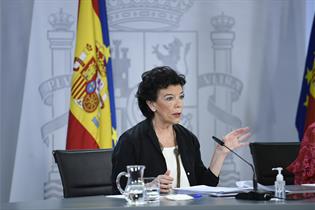 Foto: Pool Moncloa/Borja Puig de la BellacasaThe document foresees the creation of a State Register of Vocational Training that will allow any citizen to obtain a report of his or her vocational training life updated with his or her training experience. In addition, the Modular Catalogue of Vocational Training and the Catalogue of Vocational Training Offers are implemented. The current National Catalogue of Professional Qualifications is replaced by the Catalogue of Standards of Professional Competence.
Foto: Pool Moncloa/Borja Puig de la BellacasaThe document foresees the creation of a State Register of Vocational Training that will allow any citizen to obtain a report of his or her vocational training life updated with his or her training experience. In addition, the Modular Catalogue of Vocational Training and the Catalogue of Vocational Training Offers are implemented. The current National Catalogue of Professional Qualifications is replaced by the Catalogue of Standards of Professional Competence.
With regard to teaching staff, the future law foresees the creation of a new corps of specialist teachers in specific vocational training sectors, which will be open to higher vocational training technicians in certain specialised areas.
The minister also pointed out that training will be internationalised with the incorporation of at least one foreign language, with the creation of double degrees in Spanish and foreign centres, and with the mobility of teachers and students between them.
Isabel Celaá assured that, for the government, vocational training is a priority and "a national strategy capable of developing talent", and acknowledged the work of business and trade union organisations, NGOs and parliamentary groups in drawing up a project that "is open" and has generated positive expectations.
Tribute to the Educational Community
The Council of Ministers has approved an institutional declaration to pay tribute to the educational community: parents, families, students, for having been able to keep schools open in such a difficult situation as the pandemic.
The Minister for Education and Vocational Training announced that the head of the Spanish government, Pedro Sánchez, will preside over a tribute ceremony on Saturday 19 June at 11:00 a.m., at which the declaration will be read out.
Bringing Anti-Doping Law Into Line with International Standards
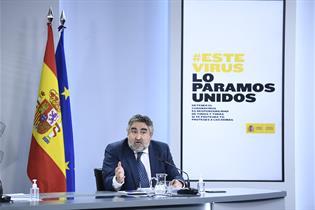 Foto: Pool Moncloa/Borja Puig de la BellacasaThe Government has approved the referral to Parliament of the draft Organic Law on the Fight Against Doping in Sports, incorporating the World Anti-Doping Code approved last January into Spanish law.
Foto: Pool Moncloa/Borja Puig de la BellacasaThe Government has approved the referral to Parliament of the draft Organic Law on the Fight Against Doping in Sports, incorporating the World Anti-Doping Code approved last January into Spanish law.
The new international rules are intended to ensure that sporting competitions are conducted on an equal footing and adapted to the athletes' own natural abilities, avoiding their adulteration through the use of prohibited substances or methods.
The Minister for Culture and Sport, José Manuel Rodríguez Uribes, explained that the law was necessary to adapt to the international standard and "highlights sports as a right and a practice linked to health, healthy living and well-being and a series of fair play values".
Three Levels of Athletes and Sanctions
The draft law distinguishes three levels of athletes - international, national and amateur - among licensed athletes and sets out sanctions for each category. The body that will exercise the sanctioning powers will be an impartial and independent Anti-Doping Sanctioning Committee, which will be integrated into the State Agency-Spanish Commission for the Fight against Anti-Doping in Sports, as the current Spanish Agency for Health Protection in Sport is to be called.
As new developments, the minister highlighted the inclusion in the list of banned substances of the so-called "abuse substances" that appear on the annual list updated by the World Anti-Doping Agency (WADA). By 2021 they are cocaine, heroin, MDMA/ecstasy and THC.
Behaviours such as collaborating in the commission of infringements, intimidating - or attempting to intimidate - witnesses or other persons in order to dissuade them from reporting any infringement or suspected infringement of the Law, and retaliating against persons who report such infringements in good faith, are also punishable. "It is about protecting those people who collaborate in the fight against doping," said Uribes.
This status of protected persons shall be extended to minors and persons lacking legal capacity or capacity to act, on the one hand to ensure that they are not induced to use substances which may be doping substances and, on the other hand, if they do so of their own free will, to ensure their fundamental rights.
Penalties shall take into account whether the doping was due to contaminated products or was the result of an accident or a situation not attributable to the person. The minister stressed that the rule is "intended to be fair and just" and seeks to promote the distinction between intentional and accidental behaviour, for which purpose the circumstances of each specific case will be considered.
Finally, the text includes the provision for a specific law on so-called animal doping related, for example, to horse or greyhound racing.
Professionalisation of the Women's Football League
During her speech, the minister referred to the announcement by the Higher Council for Sports, regarding the professionalisation of the women's football league as a "historic and decisive step in the search for equality in the field of sports".
Uribes pointed out that the Ministry is also working on grassroots, university and inclusive sports, both for people with disabilities and other groups, such as refugees, for whom sports are a great tool for social integration. Other projects include the Sportsman's Statute and a Sports Professions Law.
"Sports are a right of citizens and of the professional sportsmen and women who practise them, it is an industry that creates employment and wealth, it is Spain's brand and it is a set of values that helps us to shape the principles of a fair, well-ordered and civilised society", the praised minister.
Boosting Research and Innovation
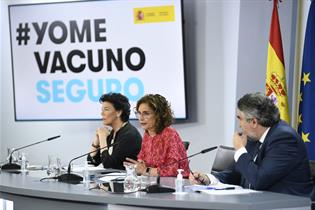 Foto: Pool Moncloa/Borja Puig de la BellacasaThe Government has approved the State Plan for Scientific, Technological and Innovation Research 2021-2023, a set of investments focused on the most strategic sectors for recovery, such as health and cutting-edge medicine, ecological transition and digitalisation.
Foto: Pool Moncloa/Borja Puig de la BellacasaThe Government has approved the State Plan for Scientific, Technological and Innovation Research 2021-2023, a set of investments focused on the most strategic sectors for recovery, such as health and cutting-edge medicine, ecological transition and digitalisation.
The Minister for the Treasury and Government Spokesperson, María Jesús Montero, highlighted the measures included for the development and consolidation of scientific careers "at earlier stages than those that are beginning now, in order to promote a generational replacement". The Plan also incorporates actions aimed at catalysing innovation and business leadership, with a special focus on small and medium-sized enterprises.
The initiative is aimed at all agents of the Spanish Science, Technology and Innovation System, both public and private, and integrates the actions foreseen in the Recovery, Transformation and Resilience Plan. Its actions will be financed through grants, non-reimbursable or partially reimbursable aids, loans, public procurement and investment mechanisms.
Strengthening the Solvency of Companies Affected by the Pandemic
The Executive has established the functioning of the Fund for the Recapitalisation of Companies Affected by COVID-19, one of the measures put in place during the pandemic to contribute to business solvency.
Montero explained the requirements for the beneficiaries, which will be medium-sized companies with a net turnover of between 15 and 400 million euros, from any sector, with headquarters in Spain and which are experiencing temporary difficulties as a result of the COVID, but which are viable in the medium and long term and were solvent before the pandemic.
The Fund will be managed by the state-owned commercial company COFIDES, which has more than 32 years of experience in the financial sector. The Fund has a maturity of eight years and will operate through different financial instruments: equity loans - the priority -, equity investments and, as a complement to the above, debt.
Lower Borrowing Costs for the Treasury
At the Cabinet meeting, the Annual Report on Public Treasury Borrowing Policy 2020, which will be submitted to Parliament, was presented.
The year closed with a net issuance of 109.922 billion Euro because, in the context of COVID-19, "the Treasury faced greater financing needs in order to maintain public services and cover additional health, economic and social measures", explained the Finance minister.
Despite this, Montero highlighted the "resilience" of the Treasury's issuance policy, which has continued to be financed at the lowest costs in its history. The average cost of outstanding government debt fell from 2.19% in 2019 to 1.86% at the end of 2020, and the average cost of new debt issuance also reached record lows, falling from 0.23% in 2019 to 0.18% in 2020.
Appeal Against the Infringement of State Powers in the Field of Housing
The Council of Ministers has agreed to lodge an unconstitutionality appeal against several articles and provisions of the Catalan law on housing and leases, on the grounds that they violate state powers in this area.
The decision has been taken because no agreement has been reached with the Generalitat after six months of negotiation within the Bilateral Commission, and it also was approved by the State Council, the spokeswoman explained. Montero also recalled that the Council for Statutory Guarantees of Catalonia had already established that the precepts that the Council of Ministers had agreed to challenge were not protected by the Statute of Autonomy and violated a number of points of the Constitution.
The minister pointed out that the precautionary suspension is not being requested because, in parallel to the processing of the appeal, the government is going to promote the State Housing Law "which incorporates many of the elements that are now, due to competition, being appealed".
COVID Report and Vaccination
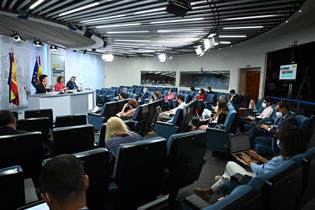 Foto: Pool Moncloa/Borja Puig de la BellacasaThe government analysed the pandemic situation and the vaccination campaign and has agreed to extend again the limitation of flights between Brazil and South Africa and Spanish airports. The measure will enter into force at 00:00 on 22 June until 00:00 on 6 July 2021 (peninsular time).
Foto: Pool Moncloa/Borja Puig de la BellacasaThe government analysed the pandemic situation and the vaccination campaign and has agreed to extend again the limitation of flights between Brazil and South Africa and Spanish airports. The measure will enter into force at 00:00 on 22 June until 00:00 on 6 July 2021 (peninsular time).
COVID-19 cases continue to fall and Spain, said Montero, is "at the head of the countries around us in terms of people who are already fully vaccinated". Specifically, 27% of the population, while 45.3% have already received a dose. The spokeswoman congratulated the health professionals for their work and the population for their willingness to be vaccinated.
As a result, the minister continued, economic activity is normalising. The Bank of Spain has improved its economic forecasts, as have the European Commission and the OECD, which have revised their estimates upwards, "so that they are in a range that remains within what the government itself had foreseen in its Stability Plan".
Current Affairs
At the press conference following the meeting of the Council of Ministers, the spokesperson of the Executive reiterated her concern at the increase in cases of gender violence and called for unity to combat this scourge. Montero has encouraged people to report violence and has pledged the government's support for women and minors who are experiencing situations of violence through greater resources for prevention and defence. In this sense, she insisted that the Ministries of Equality and the Interior are already jointly reviewing their protocols for action and protection.
Montero also assessed the news that the Partido Popular has announced that it is abandoning the Anti-Transfuguism Pact. The spokeswoman regretted this decision to no longer participate in "a fundamental instrument to avoid and prevent corruption" in force since 1998.
Montero also welcomed the fact that Madrid will host next year's NATO Summit, as announced yesterday by its Secretary General, Jens Stoltenberg, in a joint appearance with the President of the Government, Pedro Sánchez. In 2022, Montero recalled, it will be 25 years since the only NATO summit hosted by Spain to date, and it will coincide with the 40th anniversary of its accession to the organisation.
Statement by the President of the Government
The President's agenda for the rest of the week includes, according to the spokesperson, his attendance today at the reception offered by the King and Queen of Spain to the President of the Republic of Korea on the occasion of the Spain-Korea International Forum to be held in Madrid; his meeting tomorrow with the President of the European Commission, Ursula von der Leyen, on the Recovery, Transformation and Resilience Plan; and his meeting on Friday with the Italian Prime Minister, Mario Draghi, as part of various events organised by the Círculo de Economía and Foment del Treball in Barcelona.
Non official translation





